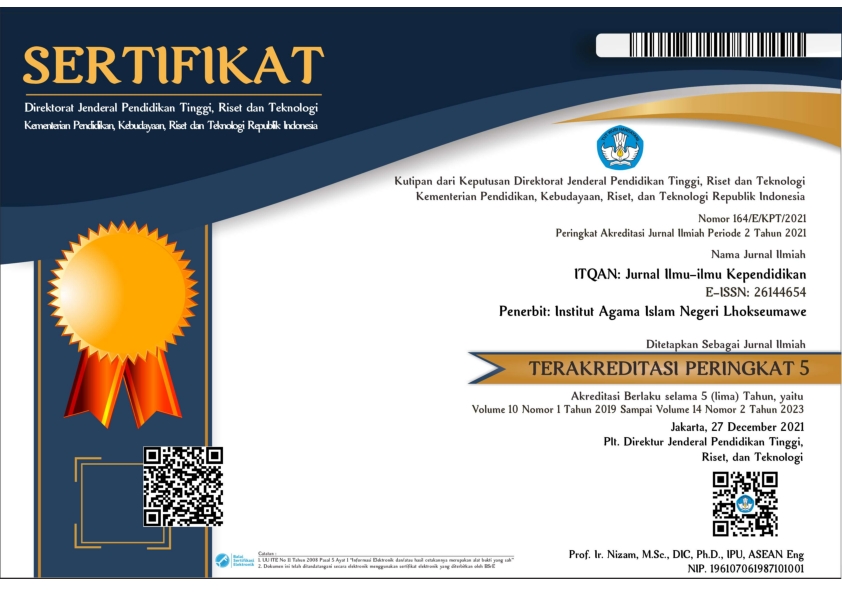Model dan Organisasi Pengembangan Kurikulum
Main Article Content
Badrun Fawaidi
The curriculum is one of the tools to achieve educational goals, and at the same time it is used as a guide in the implementation of the teaching and learning process at various types and levels of schools. The curriculum is the basis and mirror of the philosophy of a nation's view of life, it will be directed to where and how the life of this nation will be in the future, all of which are determined and described in an educational curriculum. The curriculum must be dynamic and continue to evolve to adapt to various developments that occur in the world community and must determine the results as expected. All aspects of education are then in the spotlight of all Indonesian people. The education aspect in question is the teacher, curriculum, objectives, and methods, the government as the person in charge, and of course the system that covers the educational activities. All these aspects are like links which must be addressed first.
Abdullah, A. (2007). Kurikulum Pendidikan di Indonesia Sepanjang Sejarah (Suatu Tinjauan Kritis Filosofis). Jurnal Pendidikan Dan Kebudayaan, 13(66), 340–361.
Arifin, M., Nasution, I. S., Wahyuni, S., Saehu, U., Rahayu, E., Dachi, S. W., … Sitepu, T. (2020). Modul Kurikulum dan Pembelajaran (Vol. 196). umsu press.
Arifin, Z. (2020). Manajemen Pengembangan Kurikulum Pendidikan Islam.
Arikunto, S. (2019). Dasar-Dasar Evaluasi Pendidikan (3rd ed.). Jakarta: Bumi Aksara.
Giarti, S. (2016). Manajemen Kurikulum dan Pembelajaran Berbasis ICT. Satya Widya. https://doi.org/10.24246/j.sw.2016.v32.i2.p117-126
Hamalik, O. (2008). Kurikulum dan Pembelajaran, Jakarta: PT. Bumi Aksara.
Hamalik, O. (2019). Dasar Dasar Pengembangan Kurikulum. PT Remaja Rosdakarya.
Handy, C. (2018). Curriculum Planning and Development. KEY ISSUES, 148.
Hidayat, T., Firdaus, E., & Somad, M. A. (2020). Model Pengembangan Kurikulum Tyler Dan Implikasinya Dalam Pembelajaran Pendidikan Agama Islam di Sekolah. POTENSIA: Jurnal Kependidikan Islam, 5(2), 197–218.
Idi, A. (2014). Pengembangan Kurikulum. Teori Dan Praktik.
Ilham, M., Islami, N., Abdurrahman, F., & Suryadi, S. (2021). E-aedes Framework based on Geographical Information System: Stakeholder Perceptions. Journal of Multidisciplinary Academic, 4(6), 453–456.
Manurung, L. (2019). Sejarah Kurikulum di Indonesia. JURNAL ILMIAH WAHANA PENDIDIKAN, 5(2), 88–95.
MKDP, T. P. (2013). Kurikulum dan Pembelajaran. Jakarta: Rajawali Pers.
Muhaimin, A. (2009). Pengembangan Kurikulum Pendidikan Agama Islam di Sekolah, Madrasah, danPerguruanTinggi Jakarta: PT. Raja GrafindoPersada.
Muhammad Bukhori, D., & Bukhori, M. (2005). Azas-Azas Manajemen. In Yogyakarta: Aditya Media. Yogyakarta.
Mustari, M., & Rahman, M. T. (2014). Manajemen Pendidikan. RajaGrafika Persada.
Nurdyansyah, N., Fahyuni, E. F., Mawati, A. T., Permadi, Y. A., Rasinus, R., Simarmata, J., … Purba, B. (2020). Inovasi Model Pembelajaran Sesuai Kurikulum 2013. Nizamia Learning Center.
Rusman. (2012). Manajemen Kurikulum. Jakarta: Raja Grafindo Persada.
Rusman. (2018). Manajemen Kurikulum (Revisi Kedua). Jakarta: Rajawali Press.
Salabi, A. S. (2020). Efektivitas Dalam Implementasi Kurikulum Sekolah. Education Achievement: Journal of Science and Research.
Sukmadinata, N. S. (2017). Pengembangan Kurikulum: Teori Dan Praktek. Bandung: Remaja Rosda Karya.
Sumarto, S. (2020). Kampus Merdeka; Realitas Pembelajaran Online, Riset dan Pengembangan Wirausaha. Jurnal Literasiologi, 4(2), 151–166. https://doi.org/10.47783/literasiologi.v4i2.150
Tyler, R. W. (2013). Basic Principles of Curriculum and Instruction. University of Chicago press.
Wendi, D. (2020). The 2013 Curriculum Implementation Review The Pedagogical Competence And Mastery Of Information And Communication Technology Teachers At SD Negeri. Pedagogi: Jurnal Ilmu Pendidikan, 20(2), 69–75.
Westbury, I., Aspfors, J., Fries, A.-V., Hansén, S.-E., Ohlhaver, F., Rosenmund, M., & Sivesind, K. (2016). Organizing Curriculum Change: an Introduction. Journal of Curriculum Studies, 48(6), 729–743. https://doi.org/10.1080/00220272.2016.1186736
Widyastono, H. (2010). Pengembangan Kurikulum Sekolah Bertaraf Internasional. Jurnal Pendidikan Dan Kebudayaan, 16(3), 265–274.
Wyse, D., Hayward, L., & Pandya, J. (2015). The SAGE Handbook of Curriculum, Pedagogy and Assessment. Sage.
Zuhdi, M. (2006). Modernization of Indonesian Islamic Schools’ Curricula, 1945–2003. International Journal of Inclusive Education, 10(4–5), 415–427. https://doi.org/10.1080/13603110500430765



